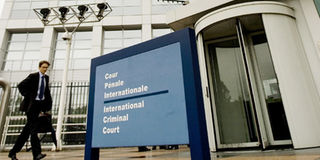Hague throws out bid to stop Ocampo case

ICC judges said the application by professors Max Hilaire and William Cohen would not help them reach a decision on whether Mr Ocampo should be allowed to start investigations into the crimes committed in Kenya during the post election violence. Photo/FILE
An attempt by two Americans to block investigations into possible crimes against humanity in Kenya has been defeated. The two professors had sought to stop International Criminal Court prosecutor Luis Moreno-Ocampo from taking over the post-election violence cases.
They had gone to the court and asked to appear as friends of the court but their request was turned down. The ruling by the ICC judges came as the Cabinet approved a Bill, which wants the Witness Protection Agency created to guarantee the safety of potential witnesses.
The three-judge bench, in their ruling on Wednesday, said the application by professors Max Hilaire and William Cohen would not help them reach a decision on whether Mr Ocampo should be allowed to start investigations into the crimes committed during the post election violence.
The two professors wanted to appear before the three judges as Amicus Curiae (friends of the court) and said they would raise objections aimed at stopping The Hague from taking over the Kenyan case.
“The Chamber, having examined the Amicus Curiae application and in particular, the different issues proposed by the applicants... is of the view that the proposed submission of observations would not assist in reaching a proper determination on the prosecutor’s request. Accordingly, the applicants’ request to appear as amicus curiae must be rejected,” the judges said.
Judges Ekaterina Trendafilova, Hans-Peter Kaul and Cuno Tarfusser are hearing Mr Ocampo’s request to be allowed to open investigations into crimes committed during the poll violence after the Kenyan Government failed to set up a local tribunal.
They also threw out Mr Ocampo’s arguments against the Americans’ objections, saying they were pointless now that the professors’ bid to join the case had been rejected. This means the judges can now begin to consider Mr Ocampo’s request to take over the Kenyan case.
Justice minister Mutula Kilonzo welcomed the development saying: “I am very pleased with the ruling and it is an indication that the court could authorise the investigations sooner. I salute the Pre-Trial Chamber because this is a very good development.”
He said the professors’ attempt to join the case was intended to delay ruling on whether Mr Ocampo can begin investigations into the suit. “I have said before that their application was an unnecessary interference. How can citizens of a country that is not a member of the ICC seek to block the investigations? It leaves a lot of questions,” he said.
Mr Ocampo went before the three judges, called the Pre-Trial Chamber, on November 26 after President Kibaki and Prime Minister Raila Odinga refused to hand over the case. However, on January 11, Prof Hilaire and Prof Cohn submitted an application to appear as friends of the court with the intention of challenging Mr Ocampo’s request. On January 15, the prosecutor asked to be allowed to respond to the issues raised by the Americans.
In Nairobi, the Cabinet, chaired by President Kibaki, approved the Witness Protection (Amendment) Bill of 2009, which, if passed by the MPs, will create a powerful Witness Protection agency. The agency will be independent and funded directly from the public purse.
A brief from the Presidential Press Services (PPS) said: “The Cabinet has today (Thursday) approved the Witness Protection Bill for submission to Parliament. The Bill proposes the establishment of an autonomous agency for the protection of prosecution witnesses, especially in major offences.”
It said the Bill borrows heavily from best practices in other countries. “Once in place, Kenya will be the third country in Africa to have such an agency,” it said. The Bill is a government response to both local and international demands to enact a law that will stop suspects from intimidating and threatening potential witnesses.
So far, six potential witnesses of the violence have been threatened and gone into hiding. The Kenya National Commission for Human Rights says it has received many complaints from victims of the violence. Chaired by a director who will be a lawyer, the agency will run a programme to secure witnesses, conceal their identity, sometimes giving them new identities and moving them to new homes if the need arises.




